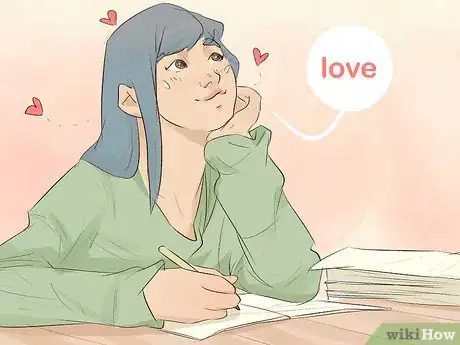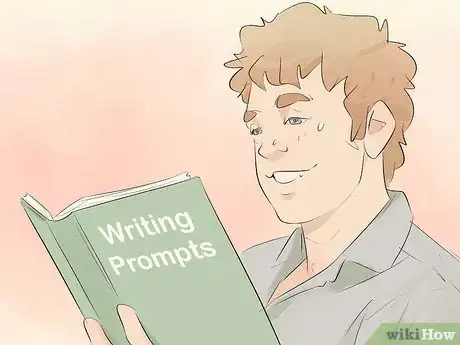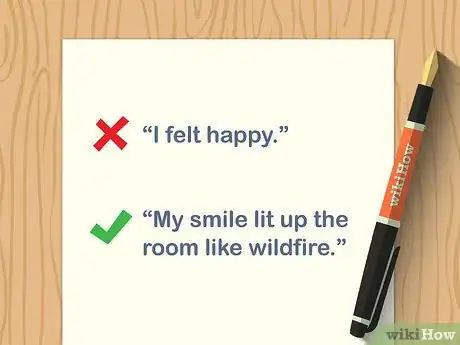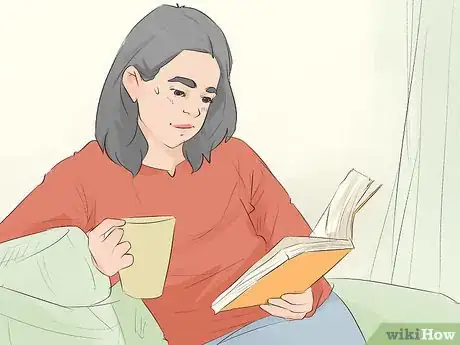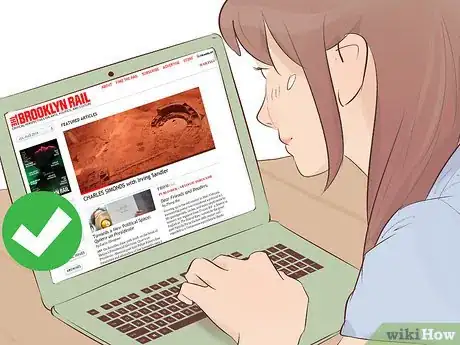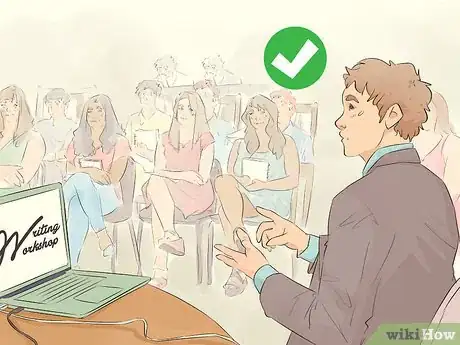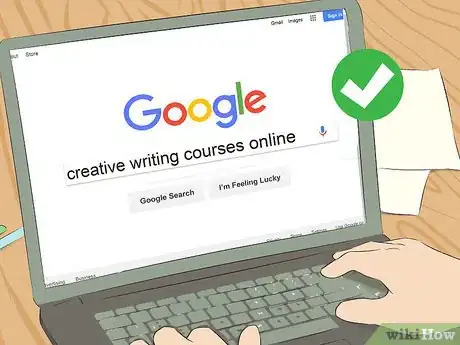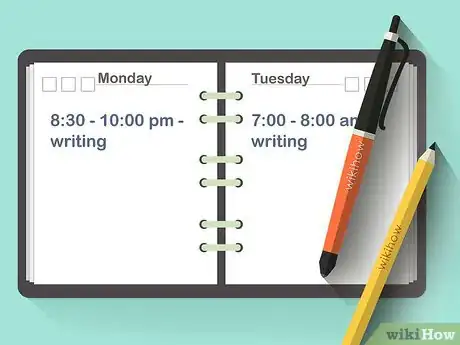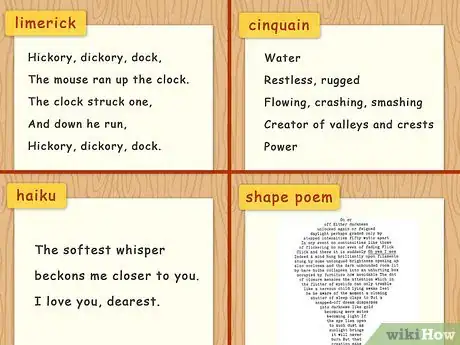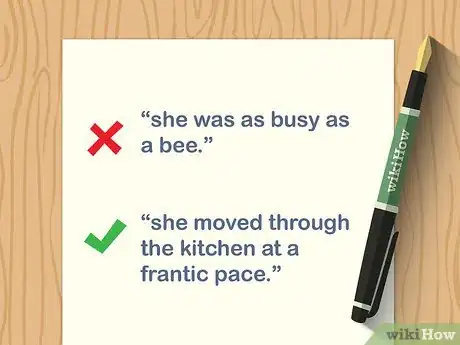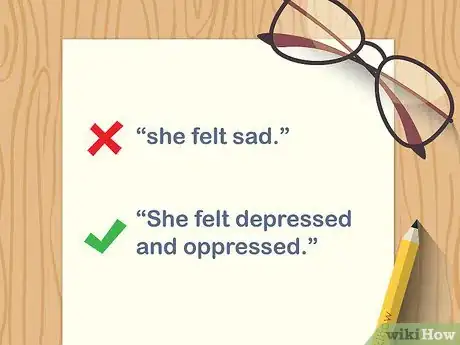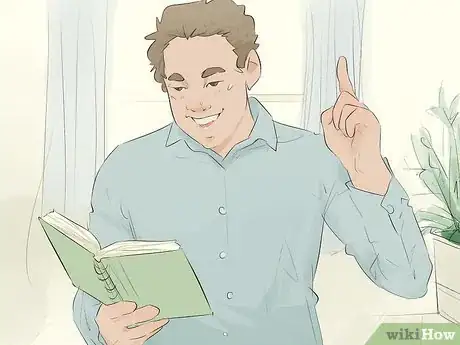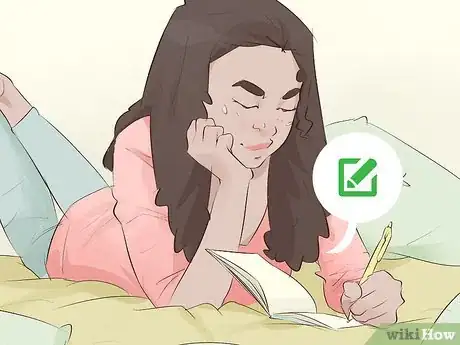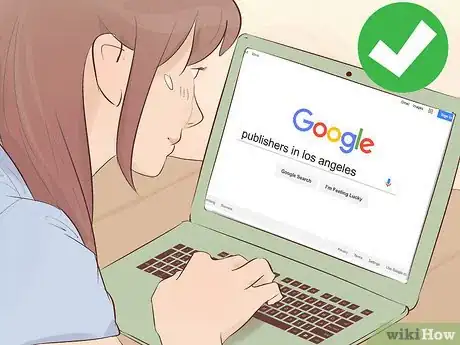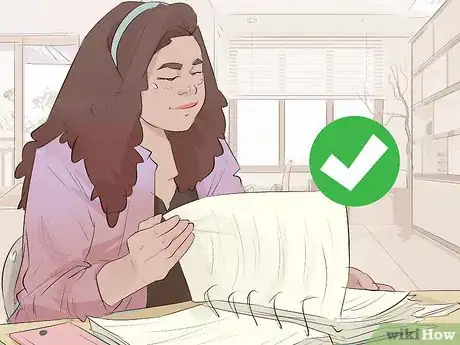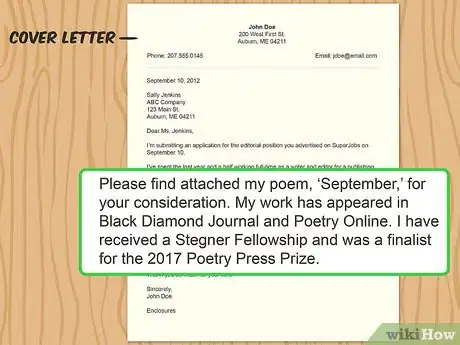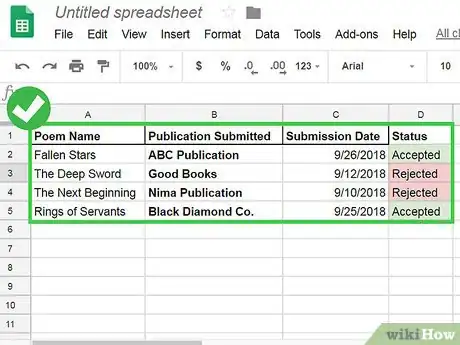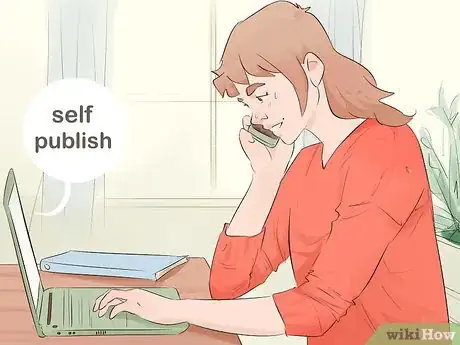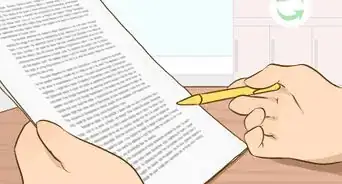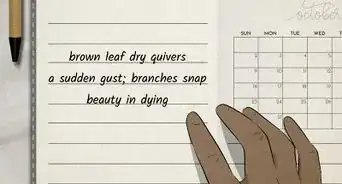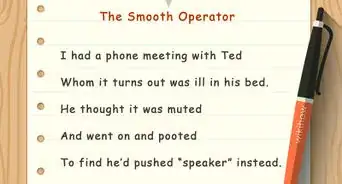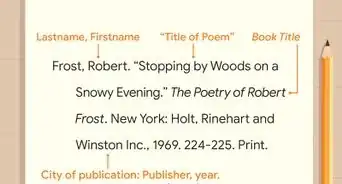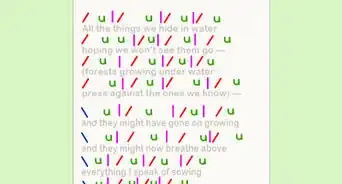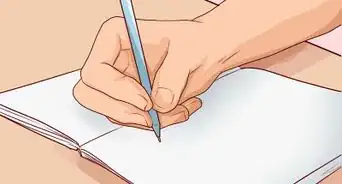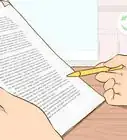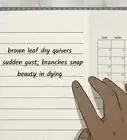This article was co-authored by Alicia Cook and by wikiHow staff writer, Hunter Rising. Alicia Cook is a Professional Writer based in Newark, New Jersey. With over 12 years of experience, Alicia specializes in poetry and uses her platform to advocate for families affected by addiction and to fight for breaking the stigma against addiction and mental illness. She holds a BA in English and Journalism from Georgian Court University and an MBA from Saint Peter’s University. Alicia is a bestselling poet with Andrews McMeel Publishing and her work has been featured in numerous media outlets including the NY Post, CNN, USA Today, the HuffPost, the LA Times, American Songwriter Magazine, and Bustle. She was named by Teen Vogue as one of the 10 social media poets to know and her poetry mixtape, “Stuff I’ve Been Feeling Lately” was a finalist in the 2016 Goodreads Choice Awards.
There are 11 references cited in this article, which can be found at the bottom of the page.
wikiHow marks an article as reader-approved once it receives enough positive feedback. In this case, 100% of readers who voted found the article helpful, earning it our reader-approved status.
This article has been viewed 150,809 times.
Poetry is a great way to capture a feeling or an experience in very few words. Poems can cover a wide variety of emotions and explore topics a reader normally wouldn’t consider. By looking for inspiration and sitting down to write, you can be a poet before you know it!
Steps
Finding Your Inspiration
-
1Pick a subject that matters to you. Think about what you value in life or take an experience you’ve had in life as the starting point for your poem. Make a list of points in your life that have affected you to find themes that you can use as a basis for your writing.[1] [2]
- For example, if you had an accident or someone close to you has passed away, you may write about mortality or celebrating life.
- Inspiration could come at any time and surprise you. Carry a small pad of paper and a pen with you or use the Notes function on your phone to write down anything that pops into your head.
-
2Write with your emotions. Think about the things that make you happy, sad, angry, or any other feelings you have. When you have an emotional stake in the subject matter you’re writing about, your poetry will seem stronger and more passionate.[3]
- Consider your audience for the poems you’re writing. The subject matter doesn’t have to relate to every single one of your readers, but they should understand the emotions you’re connecting to it.
- Try free-writing or journaling to get in the practice of writing regularly.[4]
Advertisement -
3Look through a book or website filled with writing prompts. Purchase a book specifically for poetry prompts to find inspiration when you need it. Other websites offer a new prompt every day so you never revisit the same prompt twice. Even if you don’t write a poem from the prompt, brainstorm what the prompt means to you.[5]
- Revisit writing prompts once in a while to jot down new ideas you may not have initially thought of.
-
4Find something ordinary to describe in an extraordinary way. Look around your home and out in nature to make a list of the things you take for granted. Think of new ways to describe these common occurrences using similes and metaphors. Consider what feelings they evoke.[6]
- For example, you may think about how sitting in front of a warm fire feels, or how the weather is during your favorite season.
-
5Read other poets to get a sense of ideas. Read classic poets such as Emily Dickinson, Robert Frost, or William Blake. Find styles that you like and continue reading them to understand how they structure their poems.[7] [8]
- Ask your local librarian or a literature teacher for poetry suggestions.
- Try writing a poem that emulates their style as a warm-up.
-
6Look for contemporary poets in literary journals. Look in your library and online for journals like Fence, Brooklyn Rail, or Poetry. These journals can help you find new poets that you may not be familiar with and help expose yourself to current styles.[9]
- Literary journals often list potential publishers that you can later contact when you have poems of your own.
-
7Go to open mic or slam poetry nights. Inquire at your local coffee shops or bookstores to see if they offer nights where people can share their work. This way you can meet with local poets and hear their work performed.[10]
- If you have poems you want to read or perform, these nights are great opportunities for you to practice.
Studying Poetry
-
1Attend workshops by local authors. Check with your local bookstores or libraries to see if they have any events planned for visiting poets. These usually include a reading by the poet and workshopping your own poetry. Take advantage of these events so you can continue learning.[11]
- See if your city or a city near you hosts a writer’s conference. There, you can meet other writers and attend lecture sessions.
-
2Take creative writing courses online or in school. Look at your local university or community college to find in-class options or see if online lectures are available. Creative writing covers many basics, like short stories and poetry. See if there’s a class offered with poetry as its primary focus.
- Search on YouTube or Vimeo for masterclasses or lectures from professional poets.
-
3Consider getting an MFA in poetry. Getting your master’s degree will help expose you to more poetry as well as help shape your own writing style. Your professors will help guide you and make you think critically on what does and doesn’t work in poems.[12]
- Many MFAs require you to have prerequisite courses or similar experience. Make sure you check the school where you apply for information on what you need.
- Getting an MFA in poetry doesn’t guarantee that you’ll get a job as a professional poet.
Writing Poems
-
1Set time aside each day to focus on writing. Find a time in your schedule when you feel the most productive to write your poetry. Even if you only do a brainstorming session, you’re working on getting your ideas on paper and preparing them for your poem.[13]
- Every person has a time that works best for them for writing. Try a few different times throughout the day to find when you’re the most productive.
-
2Decide on the style of poem you want to write. There are many different types of poems you can write, both structured and unstructured. Look at the styles of poets you admire and try to write something similar since you’re familiar with the structure.[14] [15]
- Many poems follow a specific rhyme scheme, but rhyming is not required. Try free verse poems to have more freedom.
- Haikus are short 3-line poems that usually discuss topics like nature or moments of beauty.
-
3Brainstorm imagery associated with the topic you want to write about. Write the main topic or theme of your poem in the center of a piece of paper. Incorporate each of the 5 senses into your brainstorming session to fully encapsulate the experience you want to convey.[16]
- Avoid using clichés in your brainstorming, such as phrases like cold as ice or busy as a bee.
-
4Use a thesaurus to find stronger, more descriptive words. Look up the word you want to replace in your thesaurus to find other words with a similar definition. Avoid using the word very, but instead find a stronger word to describe the moment.[17]
-
5Read your poems out loud when you finish them. Take pauses whenever there’s a line break or a punctuation marks. This way you’ll be able to hear the rhythm of the words when they’re spoken. If you stumble over words or something doesn’t sound quite right, adjust the wording.[18]
- Practice performing your poem to get an idea of how others may read it.
-
6Revise your poems until you’re happy with how they sound. Go back into your poem and adjust phrasing that doesn’t sound right or rhythms that don’t flow well. After each edit, read your poem aloud again to see if your edits worked. Once you’re happy with it, you’re ready to share.[19]
- Ask friends that you trust or literature teachers to look over your poems to see if they have any constructive feedback for you.
Publishing Your Poetry
-
1Search for publishers that accept your style of poem. There are various print and online media that have open submissions for poetry, but they may only accept certain styles. Look through the site or publication to see what normally gets published and tailor your submissions towards their guidelines.[20]
- Look on their site for all submission guidelines that they may have.
- Ask your local librarian for the current Poet’s Market book published annually. This book lists all places that are accepting submissions and the styles they prefer.[21]
- Look out for publishing scams. If it sounds too good to be true or they ask for money when you send in your poems, do not use them.
-
2Pick your best work to send to publications. Even if you don’t think a specific publication deserves your best work, always put your best foot forward. Only submit poems that you’ve revised and workshopped a few times.[22]
- Make sure you double, or even triple, check the spelling and grammar in your poem before submitting it.
-
3Provide a cover letter along with your submission. Tell the editor of the publication about yourself and any publishing history that you may have. Keep the letter less than 1 page long. Thank the editor for their time and consideration for looking over your work.[23]
- Cover letters are not required for all submissions. Check with the guidelines for where you would like to submit to see if it’s necessary.
- Include information if the poem you’re submitting has been previously published.
-
4Keep track of your submissions in a spreadsheet. Make a document in Excel, Google Sheets, or another similar spreadsheet program. Write down the name of the poem, where you’ve submitted it, and the submission date. Include if it has been accepted or rejected.[24]
- Keeping a spreadsheet allows you to easily keep track of your publication history and will prevent you from accidentally sending the same poem to the same publisher.
-
5Self-publish a poetry collection. Compile your poems into a document and use a publishing resource like Amazon to create a physical copy or e-book of your work. This way people can support your collection, and you receive profits and recognition for your hard work![25]
- Use Twitter and Facebook to promote your collection to let others know it’s available for purchase!
Community Q&A
-
QuestionHow do you find the best words for the poem?
 Community AnswerIf you are looking to be a poet, reach for your soul, heart and mind. Listen to the Earth. Feel the aromas of life. Record your feelings by writing them down in rhymes and metaphors.
Community AnswerIf you are looking to be a poet, reach for your soul, heart and mind. Listen to the Earth. Feel the aromas of life. Record your feelings by writing them down in rhymes and metaphors. -
QuestionIs using simple words better than complicated words in poems?
 Community AnswerWell, it depends on what you're trying to do. Sometimes you want to use words that have more than one meaning, or sometimes you are looking for words with certain sounds. Use the words that seem right and don't worry if they're too simple or complicated.
Community AnswerWell, it depends on what you're trying to do. Sometimes you want to use words that have more than one meaning, or sometimes you are looking for words with certain sounds. Use the words that seem right and don't worry if they're too simple or complicated. -
QuestionDo I have to rhyme when I write poetry?
 Community AnswerNo, rhyming is not necessary when writing poems. Many of the world's most famous poems don't rhyme!
Community AnswerNo, rhyming is not necessary when writing poems. Many of the world's most famous poems don't rhyme!
References
- ↑ Alicia Cook. Professional Writer. Expert Interview. 11 December 2020.
- ↑ https://www.bbc.com/news/entertainment-arts-29538180
- ↑ https://www.bbc.com/news/entertainment-arts-29538180
- ↑ Alicia Cook. Professional Writer. Expert Interview. 11 December 2020.
- ↑ http://www.hedgebrook.org/10-places-to-find-inspiration-for-your-poetry/
- ↑ https://www.bbc.com/news/entertainment-arts-29538180
- ↑ Alicia Cook. Professional Writer. Expert Interview. 11 December 2020.
- ↑ https://writingcooperative.com/how-to-write-a-poem-7251042873e6
- ↑ https://www.pw.org/literary_magazines
- ↑ https://ypn.poetrysociety.org.uk/features/how-to-read-at-a-poetry-open-mic/
- ↑ https://thefriends.org/2018/02/15/poetry-neighborhood-workshops-will-enlist-local-poets-residents-create-poems-saint-paul/
- ↑ https://www.pw.org/mfa
- ↑ https://www.bbc.com/news/entertainment-arts-29538180
- ↑ Alicia Cook. Professional Writer. Expert Interview. 11 December 2020.
- ↑ https://writingcooperative.com/how-to-write-a-poem-7251042873e6
- ↑ https://writingcooperative.com/how-to-write-a-poem-7251042873e6
- ↑ https://writingcooperative.com/how-to-write-a-poem-7251042873e6
- ↑ https://www.bbc.com/news/entertainment-arts-29538180
- ↑ https://www.bbc.com/news/entertainment-arts-29538180
- ↑ https://www.freelancewriting.com/feature-articles/15-marketplaces-to-publish-your-poetry/
- ↑ https://www.emptymirrorbooks.com/publishing/advice
- ↑ https://www.freelancewriting.com/feature-articles/15-marketplaces-to-publish-your-poetry/
- ↑ https://www.emptymirrorbooks.com/publishing/advice
- ↑ https://www.freelancewriting.com/feature-articles/15-marketplaces-to-publish-your-poetry/
- ↑ https://www.janefriedman.com/self-published-poet/
About This Article
To be a poet, set aside time to write every day. Pick a subject that matters to you or think about moments in your life that have affected you and find themes that you can use as a basis for your writing. If you can’t think of anything to write about, try looking through a book or website filled with writing prompts to get you going. Once you have written some poems, look for publishers who work with your style of poetry. You can then submit a cover letter of introduction and a few of your best poems for review. To learn how to self-publish your poems, keep reading!
